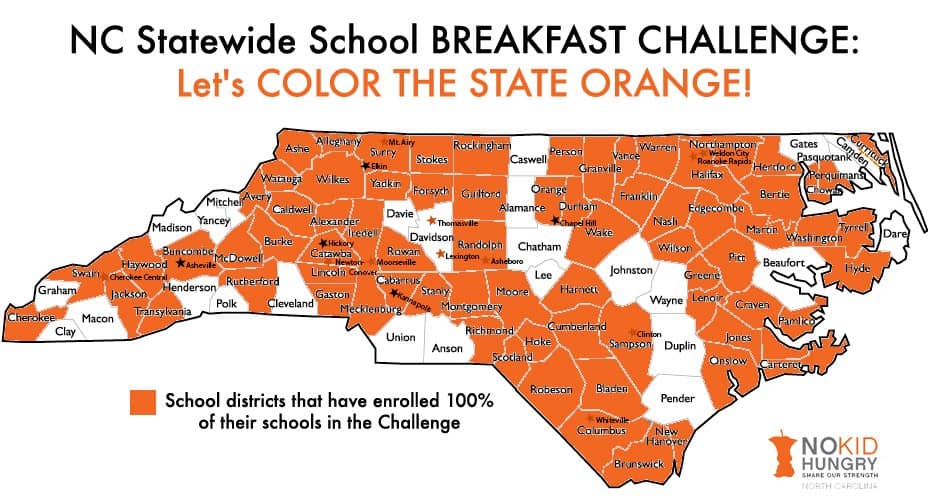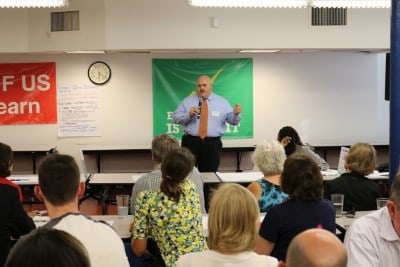Kids who are hungry are less likely to pay attention in class — and more likely to be disruptive and face discipline problems. As I’ve traveled across the state, I’ve heard stories of school nurses, counselors, and teachers who keep food on hand for hungry children.
Heidi Carter, who is on the school board for Durham County, shared at an EdNC convening that she recently met with a student with recurring discipline problems. Carter pressed the student as to why he was “acting out.” His response? “I’m just hungry.”
We know that kids with hungry bellies have more pressing concerns on their mind than another set of math problems, even when they understand the importance of gaining an education. I believe that if we are to address achievement in our schools, we must begin with the crisis of food insecurity.
No Kid Hungry NC has just rolled out the 2015 NoKidHungry@mySchool statewide Breakfast Challenge in an effort to drive solutions for “the breakfast gap.”
The breakfast gap is defined by No Kid Hungry as the students in North Carolina who eat free or reduced price school lunch who do not eat breakfast at school. No Kid Hungry’s research shows that out of the 2,423 schools in North Carolina that served breakfast in March 2015, only 23 percent of them fed breakfast to more than 70 percent of their free and reduced price lunch eaters.
For many of the students who are food insecure in North Carolina, lunch is the one guaranteed meal of the day.
“Kids who eat a free or reduced price school lunch also need to eat breakfast at school. It is safe to assume this group of kids depends on school meals as their daily source of nutrition,” explained Helen Roberts, No Kid Hungry NC’s School Outreach Educator.
The hope is that this latest challenge will help close the gap, and drive momentum, as their past two challenges have. No Kid Hungry NC understands that part of the challenge with school breakfast was based around information and strategic decisions that were being made at the district level. In order to draw attention to strategies such as Breakfast in the Classroom, Grab and Go, and Second Chance Breakfast, the concept of a statewide challenge was drawn up in hopes that it would spark a dialogue about proven, innovative strategies which could be implemented.
I must admit that I am biased when it comes to a breakfast challenge given that I participated in the early discussions around the concept, but the hard work of the entire team at No Kid Hungry is worth celebrating.
The NoKidHungry@mySchool challenge was first launched in 2013 when more than 900 schools from across North Carolina participated in a challenge to increase the percentage of students who were served breakfast; the momentum continued in 2014 when more than 1,500 schools in North Carolina enrolled in the challenge.
Schools which enrolled in prior challenges have shown impressive progress.
“This is the third annual No Kid Hungry Statewide Breakfast Challenge. Each year, more and more districts and schools participate, so there is momentum among school leaders to serve more kids breakfast at school. These districts and schools become part of the larger community of educators who are committed to providing healthy meals to the kids who need them. The Breakfast Challenge creates a fun, competitive way to motivate schools to action, and then to recognize and reward the schools that do feed more students breakfast at school. The innovative service models are a proven way to increase the number of students who start their school day with a healthy breakfast,” shared Roberts.
It is tempting to look at hunger as an intractable issue given the sheer numbers of children and families that are food insecure in this state and this country.
The promise of No Kid Hungry, both here in NC and nationally, is that we do not need a magic wand to solve hunger, but rather we must simply begin with a toolbox of proven solutions that in many cases do not require new streams of funding, but rather new energy that takes advantage of funding which is already available.
When I was faced with challenges my Grandmother, who owned the diner that provided my school day breakfast, would share the old saying, “Begin at the beginning.”
The recommended actions from No Kid Hungry strike me as the kind of approach that is needed to create change today on the serious issue of childhood hunger.
It offers the promise of successful strategies using funding sources that are already in place.
It offers the promise of working together.
After all, as Frederick Douglass once declared, “It is easier to build strong children than to repair broken men.”






